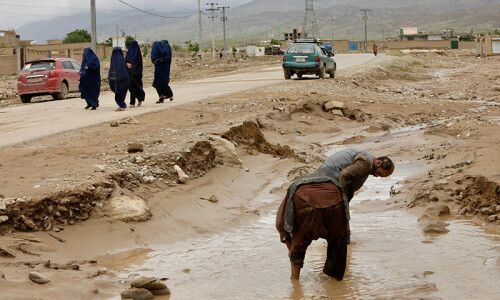BELGRADE: Ultra-nationalists led by a war crimes suspect from behind bars may become the biggest group in Serbia’s parliament. Three small parties are fielding candidates who have been indicted by the UN tribunal in The Hague.
This is democracy at work in Serbia ahead of a Dec 28 general election, expected to show strong support for the nationalist right three years after pro-Western reformers toppled Slobodan Milosevic as Yugoslav president.
“It is obviously very disturbing,” UN human rights official Laurie Wiseberg said about the four Hague indictees running in the parliamentary election, including Milosevic for his once-mighty Socialist Party.
European Union foreign policy chief Javier Solana, urging Serbs not to choose the past, told reporters in Belgrade that having accused war criminals as election candidates could be seen as a “provocation” by people outside the country.
Wiseberg, who heads the mission of the UN Office of the High Commissioner for Human Rights, expressed concern that local people and media appeared to accept it as something normal.
“Nobody seems to be terribly upset about it,” she said.
Rights activists argue that Serbs must face the truth about killings and other atrocities committed in their name during Milosevic’s rule in order to move forward and foster reconciliation with neighbours in Bosnia, Kosovo and Croatia.
Many people here see the International Criminal Tribunal for the former Yugoslavia (ICTY) as biased against them, rejecting the view widely held in the West that Serb forces were often the main culprits in the wars that tore apart socialist Yugoslavia.
“I think there has never really been an acceptance of the fact that those who engaged in war crimes should be punished,” Wiseberg said.
WESTERN PRESSURE: Under heavy Western pressure to cooperate with the UN tribunal, the outgoing pro-reform coalition handed over Milosevic and many other suspects after it took power in 2000.
But it acted mainly because the impoverished country would otherwise risk a freeze in crucial US aid.
“The government has portrayed cooperation with The Hague as a means of receiving economic assistance from abroad rather than a duty to victims and justice,” said Bogdan Ivanisevic of US-based Human Rights Watch.—Reuters













































Dear visitor, the comments section is undergoing an overhaul and will return soon.